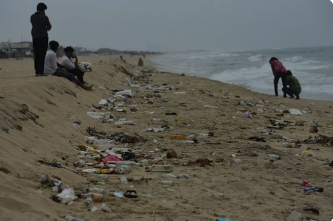The iconic Besant Nagar beach in Chennai has become the latest casualty in an unfolding environmental crisis, as heaps of debris and cement mix have been illegally dumped on its sands. This alarming situation, attributed to the activities of Chennai Metro Rail Limited (CMRL) contractors, has raised serious concerns about the environmental and ecological impact on this popular coastal area.
Overnight, truckloads of black debris, waste, and mud were offloaded along a 150-metre stretch close to the high tide zone near the famous Broken Bridge. This has created a mini-mountain range of construction refuse, posing a potential hazard to both the beach’s delicate ecosystem and the well-being of local visitors. The rapid accumulation of debris was orchestrated under the cover of darkness, reportedly by contractors working for CMRL. In response to this blatant disregard for environmental norms, the Greater Chennai Corporation (GCC) has taken immediate action. The Assistant Executive Engineer of GCC has lodged a formal complaint with the J-5 Shastri Nagar police station, leading to the registration of a First Information Report (FIR) on July 10 against the CMRL. The complaint has also been escalated to the office of the Chief Secretary, underscoring the severity of the issue.
Upon visiting the site, the Regional Deputy Commissioner (South) of GCC confirmed that the debris originated from tunnelling operations in Adyar, carried out by CMRL contractors. He stated, “We have identified the truck numbers involved in the dumping and have initiated legal proceedings against the culprits.” The swift action by the GCC highlights the importance of holding violators accountable to prevent further environmental degradation.
The illegal dumping not only violates local environmental regulations but also poses a significant threat to the coastal ecosystem. Beaches like Besant Nagar are vital for maintaining marine biodiversity and supporting the livelihoods of those who rely on fishing and tourism. The introduction of construction waste disrupts the natural landscape and could lead to long-term ecological damage, including the contamination of the marine environment and the loss of native flora and fauna.
Environmental activists and local residents have expressed their outrage over this incident, calling for stricter enforcement of environmental laws and more robust measures to protect Chennai’s beaches from similar future violations. The GCC’s decisive response serves as a reminder of the need for constant vigilance and community involvement in safeguarding our natural resources. As the investigation continues, all eyes are on the actions of Chennai Metro Rail Limited and its contractors, who are now under scrutiny for their role in this environmental offence. The outcome of this case could set a precedent for how authorities handle corporate accountability in cases of environmental negligence.



